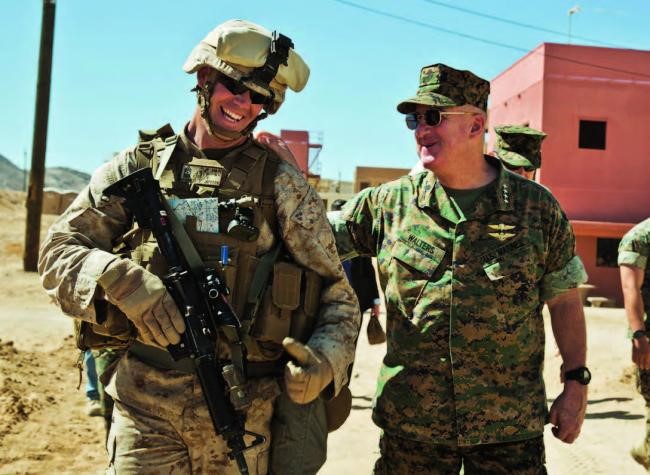
As seen in Leatherneck, Volume 101, Issue 11, by Col. Mary H. Reinwald, USMC (Ret)
Marines leave their mark on the Corps in a variety of ways, sometimes in ways they would never have imagined. General Glenn M. Walters, the recently retired 34th Assistant Commandant of the Marine Corps (ACMC), understands this better than most. A Cobra pilot who later was instrumental in establishing the MV-22 program, Gen Walters’ career has taken him far beyond the cockpit and has been marked by numerous challenges and successes.
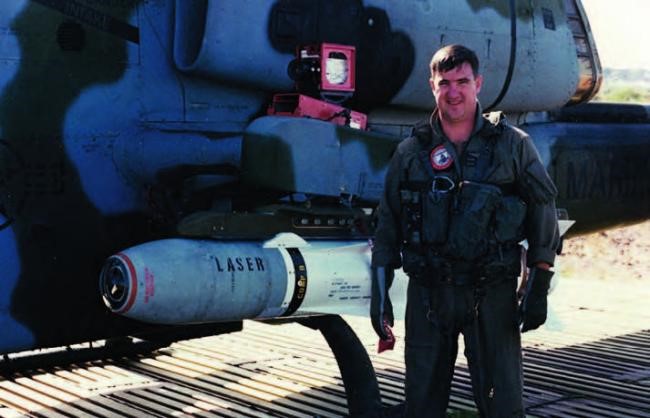
“If you look at my career path, I’ve been in places where things were not going right,” the ACMC said during a recent interview. In addition to his assignment in the Deputy Commandant for Aviation’s office as the head of its Requirements Branch during a time of decreasing funding, Gen Walters also served as the Deputy Commandant for Programs and Resources during the sequestration of 2013. “That was a challenge,” he said with a slight laugh.
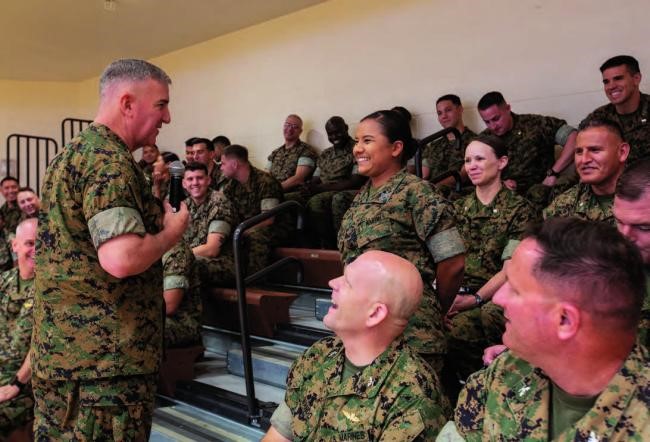
His impressive career includes two tours in the infantry as a platoon commander in 3rd Battalion, 2nd Marines and as the Air Officer and Operations Officer for 1st Reconnaissance Battalion. The future ACMC also commanded HMT-303 and later served as the first commander of VMX-22. He gained valuable experience in the acquisition field while serving in the office of the Undersecretary of Defense, Acquisition, Technology & Logistics, Defense System, Land Warfare and supported Operation Enduring Freedom as the commanding general of 2nd Marine Aircraft Wing in Afghanistan in 2011.
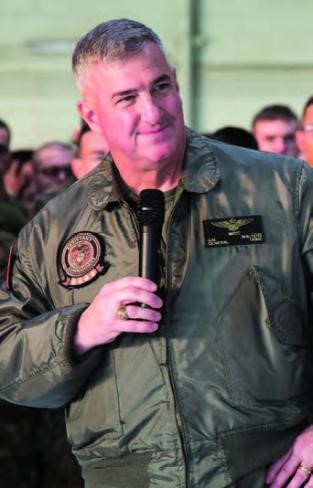
The Task Force
It was his efforts as the head of the Marine Corps task force created in the wake of the “Marines United” scandal, however, that may have the most lasting and significant impact on the Marine Corps of today. The scandal broke in early 2017 and revealed a significant social media presence of active-duty and veteran male Marines who denigrated their female counterparts through the unauthorized sharing of photos and the posting of demeaning and degrading comments about the presence of women in the Corps. General Robert B. Neller, Commandant of the Marine Corps, created the task force to address the cultural issues in the Marine Corps which led to not only the misconduct but the acceptance and tolerance for behavior clearly not in keeping with the Marine Corps’ core values of honor, courage and commitment.
The ACMC has headed the task force since its establishment and has worked with Marines of all ranks to update training and regulations in order to send a clear message to all Marines as to what is appropriate and acceptable in the realm of social media. “While those changes address the immediate behavioral issue, we also remain committed to addressing and evolving our culture by changing the way we educate, train, and lead our Marines—we will not tolerate a lack of respect for any member of our team,” said Walters.

The initial meetings of the task force were especially enlightening for the four-star general. “We unpacked it all in those first couple of meetings.” Meetings that were supposed to last an hour ended up surpassing the four and a half hour mark as the ACMC ensured that everyone, from the most junior Marine present to the sergeants major and generals, had an opportunity to provide input. “We had to get it all on the table. And then once it was all on the table and all of us were exhausted, we had to sort through it. Make sense of it. Organize it. And decide what we’re going to do with it.”
In its first six months of existence, the task force was instrumental in publishing guidance on social media misconduct including a “Leaders’ Handbook and Discussion Guide” and ALMARs and other messages providing guidance to all Marines to ensure they have a clear understanding of the issue, are able to identify what constitutes misconduct, and understand what actions, both punitive and administrative, are available for the Marines who continue to engage in such behavior. Of note, 160 persons of interest (22 civilians and 138 Marines) who have engaged in the egregious conduct on social media have been identified, and numerous courts martial, nonjudicial punishments and administrative separations have been conducted through mid-2018.
“I think it’s important to recognize that our understanding of the issue has evolved over time,” said Gen Walters. “How we handle cases today is much different and more effective as a result of what occurred with “Marines United.” Moving forward, we are planning to establish a permanent structure that can address all of the factors that contribute to the negative subculture that has allowed this behavior to exist.”
Talent Management
Recognizing that the challenge is much broader than social media postings, Gen Walters has also overseen the establishment of the Personnel Studies and Oversight Office (PSO) whose mission is to “oversee, assess, and recommend changes to policy to optimize the ability to attract, properly assign and retain the talent necessary to achieve institutional and strategic objectives in the Marine Corps.” A key element of the PSO is listening to input from Marines throughout the Corps in order to “create an environment that emulates our Corps values” while also ensuring “all Marines and civilians are valued based on their individual excellence and commitment to war-fighting.”
According to Melissa Cohen, the director of the PSO, Gen Walters “has worked tirelessly over the last 18 months to enact positive changes and initiatives within the Marine Corps, always ensuring that Marines, Sailors, and civilians are treated with dignity and respect. He stood up the Personnel Studies and Oversight office in June 2017 to demonstrate the Marine Corps’ long-term commitment to strengthening our culture. Since that date, he has been actively engaged in paving the way for future leaders to follow suit. Gen Walters has continually emphasized the clear connection between mission readiness and recognizing the value of each team member, knowing that we are a more lethal force when we do and that it will be key to the Marine Corps’ success in the future.”
In addition, the ACMC heads the newly established Talent Management Executive Council (TMEC). The TMEC, a senior leader decision forum, “serves as the catalyst for ensuring we attract, develop and retain talented men and women.” According to Gen Walters, the TMEC is a “way to get these issues up to the senior leadership of the Marine Corps once a month. You have all the interested parties, everyone who can have a stake in the success or be an impediment, all at the table looking each other in the eye. Are we going to change this policy? How are we going to change this policy? What do we need? You can plow through a lot of these [issues] quickly.” He continued, noting that the Corps had “professionalized our talent management leadership. It will ensure the success and staying power of the initiatives and gives a venue to always do the right thing for the Marines and our institution.”
Discussions within the TMEC have ranged from officer and enlisted assignments and Defense Language Aptitude Battery testing to addressing such concerns as hiring and retaining Marines for the ever-growing cyber workforce. In addition, the TMEC has identified funds for Marines throughout the Corps to attend conferences focused on their professional development including the recent Joint Women’s Leadership Symposium held in June in San Diego with more than 200 female Marines in attendance. The ACMC served as a guest speaker for the second year in a row and personally engaged with many of the Marines as he listened to their concerns and updated them on the Corps’ efforts to combat disrespect toward female Marines and the integration of women in the combat arms military occupational specialties. “Integration is not only the right thing to do, integration is essential to winning our nation’s battles to maintain our freedom. All in an environment where only 29 percent of our population is qualified to serve,” said Gen Walters. The ACMC recognizes the changes the Corps has faced in recent years. “Diversity is an output of a culture that is inclusive so inclusion is what we should be going for,” he said. “If you are inclusive in your organization or in your society, diversity will be the natural outcome and it’ll be diverse to a level that the talent can produce,” he added. His last few years on active duty have been an education, and Gen Walters has been an eager student. “There’s this idea of unconscious bias. Not just for gender race relations but also I think it has applicability to how we teach leadership … We all have an unconscious bias of some kind. It was baked into you as a human because of where you grew up, how you grew up.” He has reached the conclusion that unconscious bias “doesn’t mean you’re crippled. Doesn’t mean you’re even an immoral person. It’s just a factor of how we all grew up differently.” He believes that good leaders are aware of others’ biases. “Understanding your own unconscious bias … If we can understand it, we will be more ethical decision makers. We will make better decisions because we know ourselves,” said Gen Walters. “When you’re the commander, if you’ve thought about this, then before you put someone’s life on the line or before you expend resources or before you move people around or manage your talent and your organization, if you understand this concept, and you apply it to your decision making, we’ll be a better Corps,” he added.
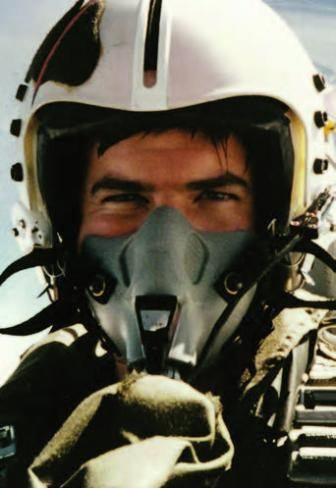
The Citadel
The Marine Corps’ second most senior Marine will continue to provide his leadership and the benefits of the lessons he has learned to a new generation of future Marines and other service members. After his retirement ceremony in early October, Gen Walters and his wife, Gail, headed south to his alma mater, The Citadel, where he assumed the duties as the 20th president of the venerable Southern institution. “You know I’m looking forward to ending where I started … It will keep me young.”
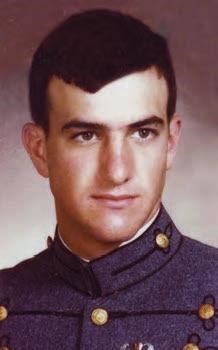
Having spent his high school years in northern Virginia, The Citadel seemed an unexpected choice for Walters, who knew that he wanted to serve in the military. Selected as an alternate for the U.S. Naval Academy, Walters said, “If you would have asked me back then, I wouldn’t have said I was undisciplined, but I knew I needed some structure.” He continued to explore his options beginning with Virginia Military Institute, a natural choice as he spent the last few years of his childhood in Oakton, Va., followed by a visit to The Citadel where he had a wonderful first impression and his decision was made.
His father, a veteran CIA station chief, had plans for his son. “My dad wanted me to go in the Navy. I wanted to major in history and join the Marine Corps and he wanted me … to go in the Navy and be a submariner.” They compromised—Gen Walters majored in electrical engineering and joined the Marine Corps.
Like so many others, Walters was influenced by the Marines around him. “There were three people there [at the Citadel] who convinced me and they didn’t do it overtly but just by their example. One was a guy named Gunnery Sergeant Lee, who retired as Sergeant Major Lee, 13th Sergeant Major of the Marine Corps.” The two others were LtCol Spivey and Col Moss [who later retired as a brigadier general] who were the senior Marines in the NROTC unit. “Those individuals just impressed me so much. I said that’s who I want to be so even before my junior year I switched over to become a Marine officer student.”
As his days on active duty dwindled, the ACMC reflected on his time in the Corps. When asked what his favorite assignment was, he didn’t hesitate. “My favorite assignments were anytime I could lead Marines,” he said, emphatically noting that he didn’t say commanding Marines. “You can do other jobs where you can lead Marines.”
He went on to describe his best days. “When you accomplish a mission and get to be around Marines. That’s really why people stay around as long as they do because every day is a good day.”
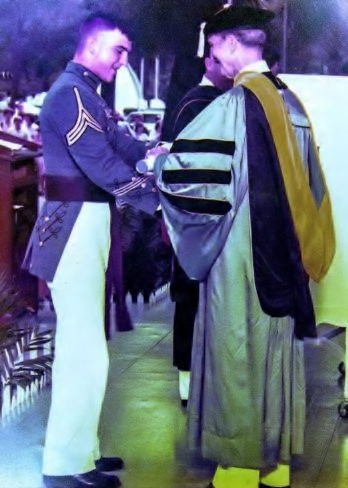
After meeting thousands of Marines during his tenure as ACMC and seeing the future Marines and other servicemembers as the new president of The Citadel, the general has few worries about the future and was quick to point out that nothing keeps him up at night. “I don’t go to bed at night worrying about how we will do as a Marine Corps. I know we will succeed; we’ve always succeeded and we always will succeed.”
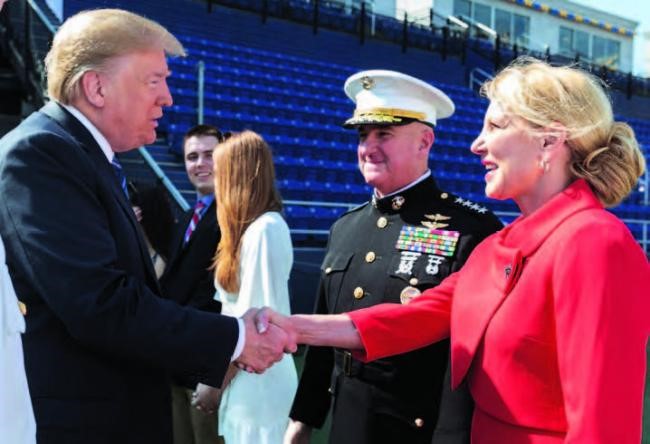
President Donald J. Trump greets Gen Walters and his wife, Gail, during the graduation and commissioning ceremony of the U.S. Naval Academy Class of 2018, Annapolis, Md., May 25.

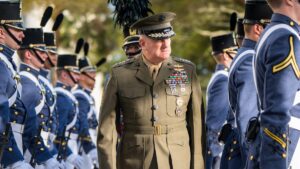 Citadel President to retire, culminating a 50-year career in public service
Citadel President to retire, culminating a 50-year career in public service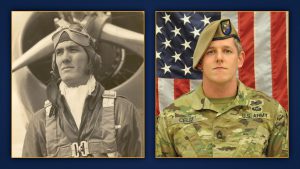 The Citadel to award posthumous degrees to two former cadets, both who were killed in action
The Citadel to award posthumous degrees to two former cadets, both who were killed in action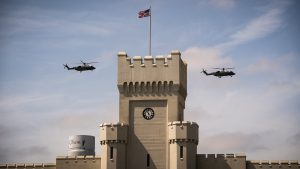 The Citadel gets a preview fit for a president
The Citadel gets a preview fit for a president

